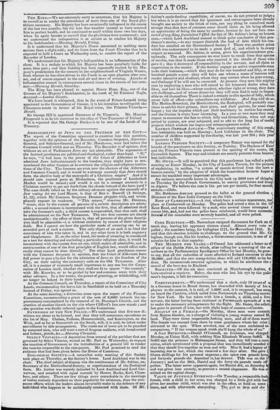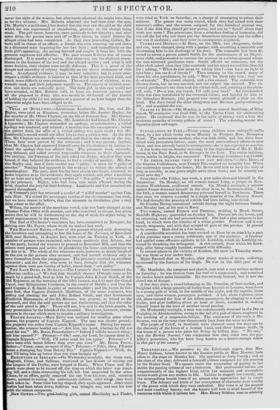EMBEZZLEMENT.—We understand that a clerk, only 18 yews of a ,
in a German house in Broad Street, has absconded with money of his e ployers to the amount, it is said, of 5,000/. and, ia is supposed, has escaa on board the Cambria, which sailed from Portsmouth OB Thursday morrin for New York. He has taken with him a female, a child, and a live. servant, the latter having been stationed at Portsmouth upwards of a wi to make the necessary arrangements for the flight. Mr. Gates, the solicit has gone in pursuit of him, but with slight hope of success.—Courier. ASSAULT ON A FEMALE.--OG Monday, three men were commit from Hatton Garden, on a charge of violating a young woman named H. land. They were three respectable-looking men and all of them marri The female was rescued from them by some gentlemen whom her cries 1, attracted to the spot. When arrested, one of the men exclaimed to companions, "If the woman speak truth she'll hang the whole of us." A GAY DEcmvEn.—Daniel O'Connell, an Irishman, was charged Monday, at Union Hall, with robbing Miss Elizabeth Weston Soffill. Soffill met the prisoner in Bishopsgate Street, and they fell into a conv, satiun, which terminated with a proposal that was immediately acceded ti that they should live together as man and wife. Miss S. had a legacy of becoming due to her, which she received a few days after. She gave fifteen shillings for his personal expenses,;- she spent two pounds hers( and forty-six pounds she deposited rn,her.drawer. This was on the I January ; and on the 20th, Danieland• the forty-six pounds made off' gether. The latter never appearedatgain, but Daniel did, on Saturday and was given into custody, to prevent a second elopement. He was c( mitted on the capital charge.
VALUE Or JUVENILE EVIDENCE.—On Tuesday, a respectable-looli female, with a child in her arms, was charged by a little girl with ha4 given her another child, which was also in the office, to hold on some tence, and with afterwards absrAinding. The giel a'fArst said she
never lost sight of the woman, but afterwards admitted she might have done so for five minutes. Mrs. Roberts admitted she had been near the spot, (St. Martin's watchhouse,) but denied that she ever saw the girl or the child which she was represented as abandoning, previous to the charge being made. The girl swore, however, most positively to her identity; and after some delay, the parties were sent off to Bow Street, in which district the alleged crime had been committed. As they were proceeding thither, Ro• berts still in charge Of an officer, a female was seen running up and down in a distracted state inquiring for her lost baby ; and immediately on the little girl's appearing, she sprang forward and caught it from her with the greatest eagerness and affection. The poor woman Roberts was of course discharged. It is worthy of notice, that there was not the slightest resem- blance in the features of the real and the alleged mother ; and what is still more decisive, their clothes were totally different. This is a proof of the danger and absurdity of relying implicitly on the direct testimony of chil- dren. As collateral evidence, it may be very valuable ; but in every other respect a child's evidence is inferior to that of the most practised thief, and much more difficult to cross-examine. The moral sense of children is ex- tremely weak, and their judgment equally so. The objects of childish aver., sion and desire are naturally petty. The little girl in this case would not have scrupled, as Mrs. Roberts said, to hang an innocent person ; and all she proposed in doing this, was merely to rid herself of the trouble of holding the child for ten minutes or a quarter of an hour longer than she otherwise might have been obliged to do.



































 Previous page
Previous page